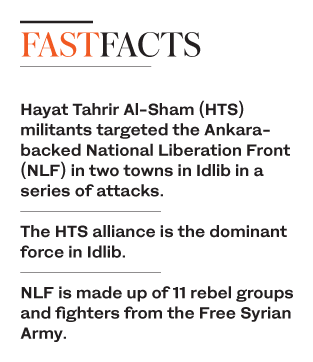Egypt court hands Muslim Brotherhood leaders life sentences
ANKARA, Turkey: Attacks by Hayat Tahrir Al-Sham (HTS) militants in Syria’s northwestern Idlib province were an attempt by the Daesh-backed alliance to strengthen its grip on the region and frighten other factions into submission, analysts said.
HTS fighters targeted the Ankara-backed National Liberation Front (NLF) in two towns in Idlib in a series of attacks since Monday, provoking intense clashes.
The Syrian Observatory of Human Rights, a UK-based war monitor, reported shelling and rocket exchanges around the areas of Latamna and Al-Sarmani, north of the city of Homs.
Areas around Aleppo were also targeted. An NLF military vehicle was badly damaged by shellfire in Al-Atarib, in western Aleppo.
Schools in the opposition-controlled enclave were closed because of the fighting.
 The HTS alliance is the dominant force in Idlib, Syria’s last opposition stronghold, which is covered by a deal backed by Turkey and Russia to prevent a regime assault. NLF is made up of 11 rebel groups and fighters from the Free Syrian Army.
The HTS alliance is the dominant force in Idlib, Syria’s last opposition stronghold, which is covered by a deal backed by Turkey and Russia to prevent a regime assault. NLF is made up of 11 rebel groups and fighters from the Free Syrian Army.
In the latest clashes, rebels surrounded five villages, all close to the main Aleppo-Latakia highway.
Control of the M4 and M5 highways between Aleppo and Latakia offers HTS militants a financial lifeline, observers said.
According to an agreement brokered on Sept. 17 by Moscow and Ankara, the highways will be open to free trade by the end of 2018.
Experts said that with the standoff over Idlib far from resolved, HTS militants were also seeking to increase their bargaining power with Russia and Turkey as the fragile truce crumbles.
Two deadlines for implementation of the Idlib demilitarization deal in early October passed without the withdrawal of an estimated 10,000 militants in the region.
The withdrawal was designed to allow the creation of a demilitarized zone to be jointly patrolled by Russian and Turkish forces.
“HTS presents a headache for Turkey primarily because the Turkish government took responsibility for clearing the demilitarized zone in Idlib,” Timur Akhmetov, a researcher at the Russian International Affairs Council, told Arab News.
According to Akhmetov, Russia has acknowledged that Turkey is “doing its best,” but has made it clear the present situation cannot be maintained forever.
“Clashes between HTS and the Ankara-backed NLF can be viewed by Russia as a part of Turkish efforts to change the balance of power in Idlib. For Russia it is a positive trend since HTS, the most powerful faction in the region, is increasingly challenged by Turkey,” he said.
Russian President Vladimir Putin recently held talks with his Turkish counterpart Recep Tayyip Erdogan on the setting up of a new quadrilateral summit on Syria, with Germany and France brought into the settlement process.
Navvar Saban, a military analyst at the Omran Center for Strategic Studies in Istanbul, told Arab News that the latest clashes were also related to a power struggle between HTS and NLF over a local council.
According to Saban, HTS gained popularity by not only being the strongest but also the most brutal faction in Idlib.
“A significant part of the latest clashes is related to maintaining control over the infrastructure, because most of the factions depend on this for income and lack external channels to ensure survival,” he said.
Local income sources include people smuggling with fees of up to $500 per person.
“HTS has several checkpoints on the smuggling zones, which are a major income source for them. They have links with the smuggling networks,” Saban said.




